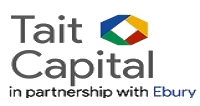
Tait Capital
In partnership with Ebury Take your business anywhere With tailored currency services and flexible business funding Tait Capital, the global finance specialist, is empowering businesses to trade smarter with the world. We work with business and organisations across the world, providing them with greater and faster access to finance, while helping them to manage currency risk and strategically plan their approach to overseas payments.